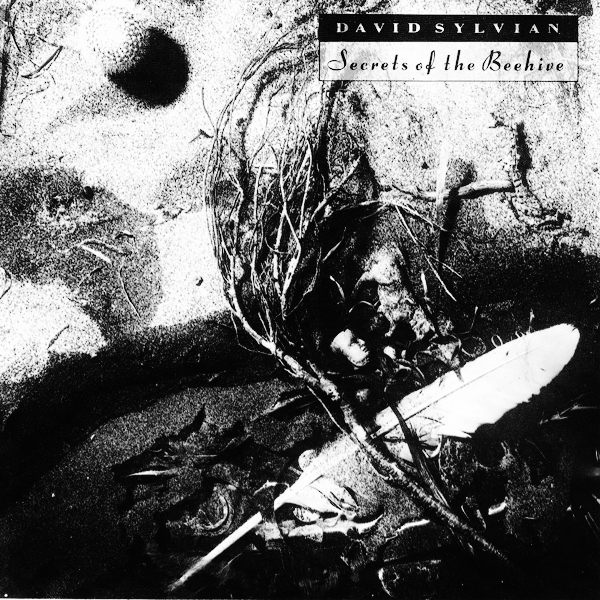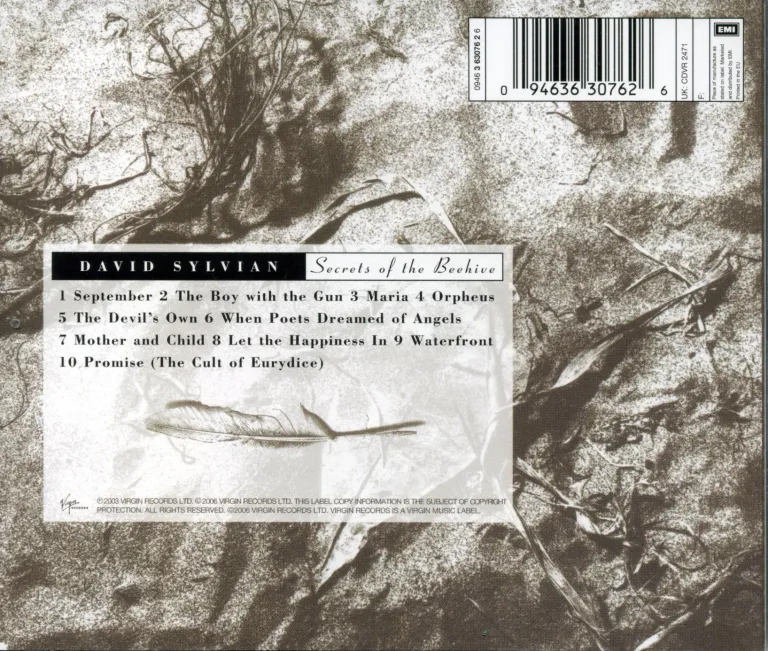Secrets of the Beehive (1987), David Sylvian

David Sylvian has gone through many changes, from a dangerous perfect-haired glam rock sex symbol in the mid-70s incarnation of his band, Japan, to perfect-haired made-up auteur bishonen in the early-80s, and then pivoting to perfect-haired (and possibly) Maoist-intellectual in geek-chic glasses during the “Tin Drum” era of Japan; and finally, around the time of his 1987 solo record “Secrets of the Beehive,” a down-to-earth reclusive bishonen who no longer wears makeup but still has perfect hair forever.
Being a “solo artist,” putting – only – your name on the cover of albums, is an interesting phenomenon. It’s unlikely that one person is the sole creator of an album’s worth of material composed of varied instruments (unless you’re Prince), and in David Sylvian’s case, he’s certainly not playing all the instruments himself, as indicated by the lengthy personnel credits within the liner notes, including Ryuichi Sakamoto on strings and synths, a renowned Japanese avant-garde musician, actor, general savant, and Sylvian’s close friend; a starcrossed kinship reflecting the eccentricity of both men.
The truth is that being recognized as a “solo artist” with a full backing band is a privilege earned through perseverance, unique vision, and, sometimes, just being – that – cool. If I sound flippant, that’s the opposite of my intention because David Sylvian actually deserves it. This is the man who wrote “Ghosts,” a lamentation so relatable in its capture of regret that it propelled itself into the number 5 spot on the UK Singles Chart, despite being a slowly hushed whisper antithetical to anything labeled “pop” at the time; coupled with the fact that Sylvian was the inspiration for the mid-80s “New Romantic” aesthetic, and bands like Duran Duran shamelessly imitated his entire style (which itself was inspired by a hodgepodge of David Bowie characters). Is it any wonder that when David Sylvian says, “I want you to play on my solo record,” you drop everything and play on his solo record?
The point is: David Sylvian is cool in a way others can only hope to capture in fleeting moments of pale imitation. David Sylvian is entirely himself. But that’s enough attention-deficient-detouring, let’s talk about the music.
“Secrets of the Beehive” is about mood, particularly a pensive, somber mood, like watching leaves fall and wither in autumnal real time. That last line tries-real-hard to invoke David Sylvian’s beautiful lyricism but fails in spectacular fashion, and that’s because throughout Beehive, Sylvian plays the role of narrator for ten grand stories written humbly to craft Byzantine emotional landscapes for the often-unfortunate protagonists to travel through in each story; sometimes, the protagonist is David Sylvian himself.
“September” sets the climate and, clearly, the month in which these stories take place. September is the guillotine of summer, the symbolic end of the carefree, childlike wonder. It’s only appropriate that “September” is a sparse piano hymn that invokes a whispered sense of longing for a time that only just recently slipped away. “Sipping Coke and playing games,” he reminisces while the summer fades, with strings softly creeping into the mix as if they were there all along. Ironically, while September is the end of a season, it’s the beginning of the record.
With the realization that summer’s fading comes “The Boy With The Gun,” a fantasy of violence in which the protagonist dreams of killing those whom he perceives as having wronged him. Autumn’s leaves wither in our protagonist’s mind as he “carves out the victims’ names in the wooden butt of the gun.” Yet, as we round the bend to the end of this short story, Sylvian, in a rare moment of vulnerability, sings “my name’s on the gun.” This track, like many others on Beehive, draws on the theory of minimalism, a motif found throughout the record, driven by a plucky double bass line and subdued guitar licks that add sinister fringe to the whole affair.
David Sylvian sings, “I harbor all the same worries as most, the temptations to leave or to give up the ghost,” as he struggles to find inspiration and hope in his dreams. “Standing firm on this stony ground, the wind blows hard, pulls these clothes around,” he sings, effortlessly coloring the mood on “Orpheus,” an epic poem reaching out to Homer’s pantheon for inspiration, swirling with subtle chords, swelling horns, and sleepy synths resembling, perhaps, the onomatopoeia of dreams bubbling up right before deep sleep. “Orpheus,” in many ways, is David Sylvian’s Iliad, epitomizing the album it finds itself on, fusing elements from each story while borrowing pop song structures on loan from the Greek bard of divine musical inspiration.
Video: David Sylvian Performs Orpheus Live
Breaking the mold, “When Poets Dreamed of Angels” uses classical Latin-tinged guitar tones to create an infectious opening too beautiful for the subject matter. “The bruises inflicted in moments of fury … next time I’ll break every bone in your body.” An elegy of violence serenaded in such melodious iambic pentameter that the listener can’t help but rewind and listen to it again before trailing off into jazzy improvisation.
In many ways, “Secrets of the Beehive” is a direct sequel to Japan’s “Ghosts,” covering similar themes and expanding on the musical concepts, particularly jazz and minimalism, that David Sylvian would continue to pioneer in later work. Like the ghosts of the past, “Secrets of the Beehive” is a haunting; tracks such as “Maria” and “The Devil’s Own” invoke a sense of disquieting unease, perfect for exercising the wraiths after two glasses of red wine, while “Let The Happiness In” tries to recoup with its doomed grasp at hope before finally succumbing to the rain in “Waterfront,” a song that sounds like the younger brother of “Ghosts,” with its use of empty space creating a void of anticipation before a great wave of emotion. Japanese pressings of the album include a final track, “Promise (The Cult of Eurydice),” a soft ballad made up of only Sylvian’s light guitar strumming and baritone and Ryuichi Sakamoto’s sparse keyboards, invoking the ancient story of Orpheus’s attempt to save his true love’s soul, only to spiral into despair after losing it all in a game with the god of the underworld.
If you’ve read this far and truly want to know if “Secrets of the Beehive” is worth your time, consider the following hypothetical: if you can smell the autumnal aroma drifting through September skies and recognize the beauty in its ephemeral existence, then “Secrets of the Beehive” is well worth every moment.
